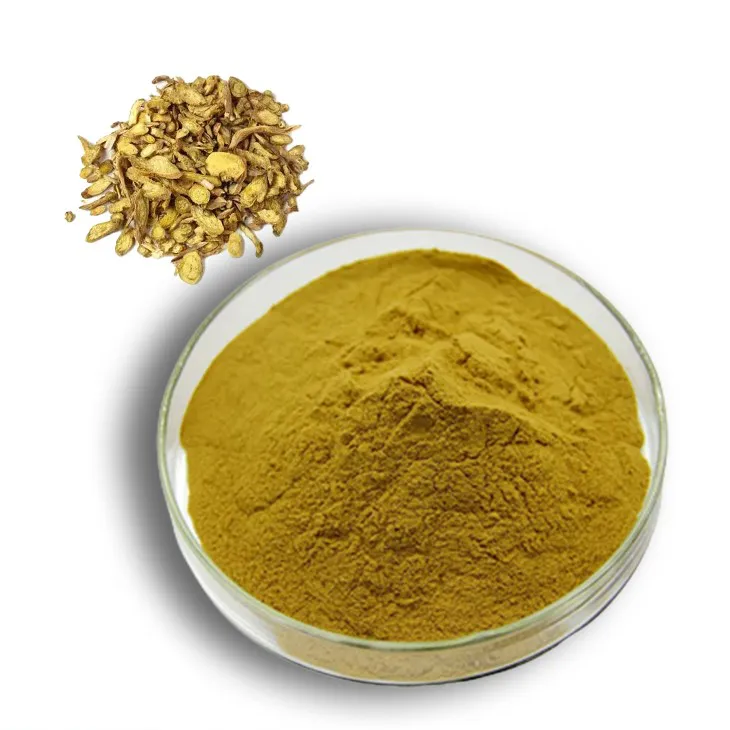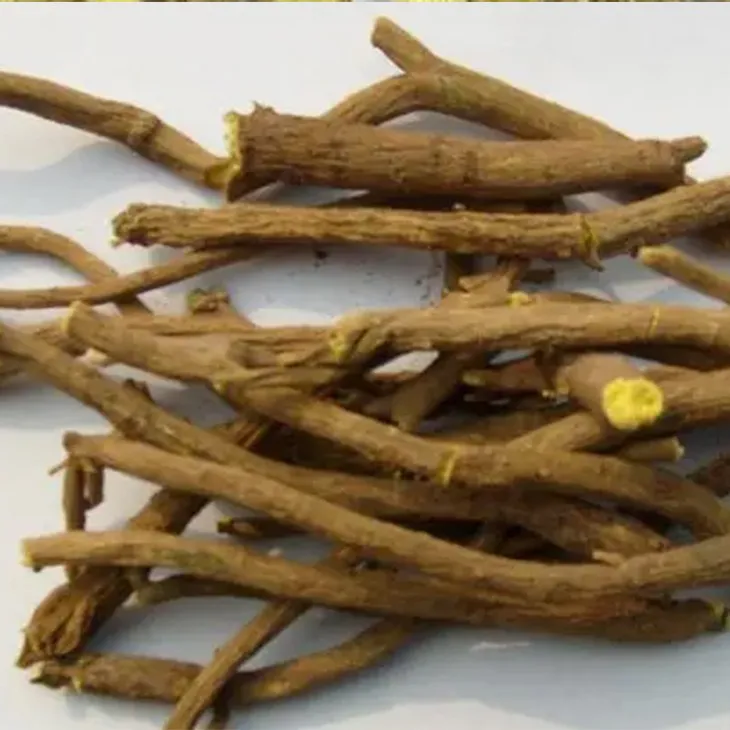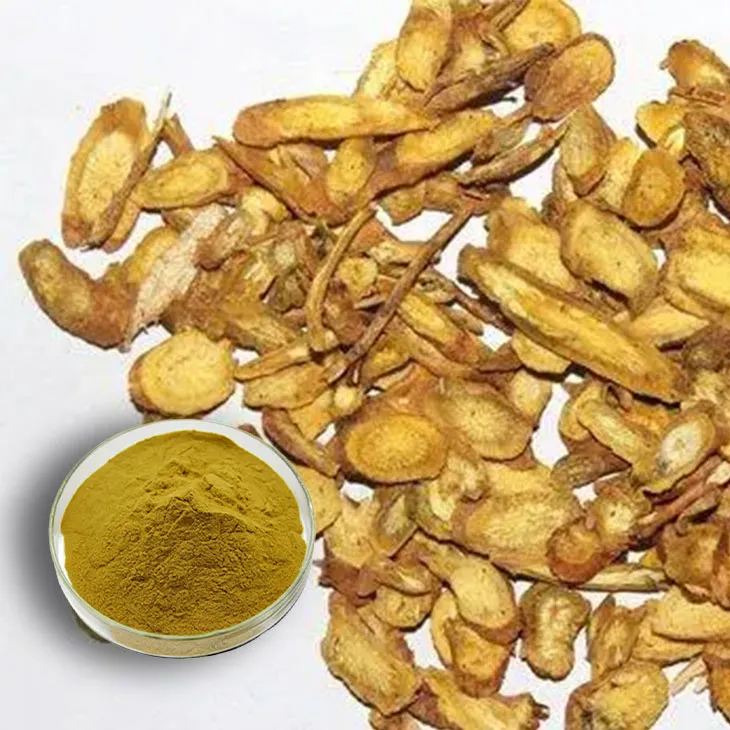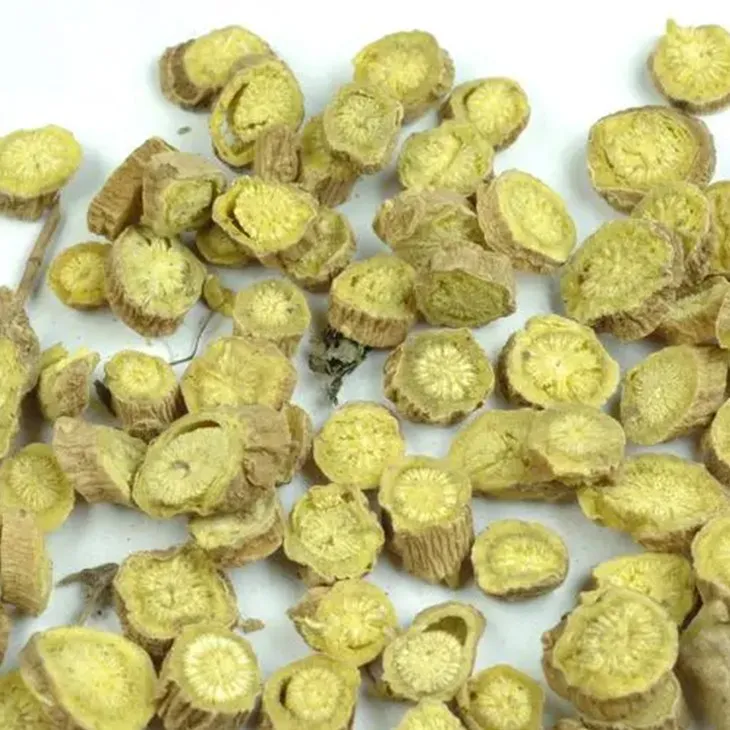- 0086-571-85302990
- sales@greenskybio.com
Chinese Baicalin Factories.
2024-12-01

Introduction to Baicalin
Baicalin is a significant natural product in China, which is deeply rooted in the country's rich traditional medicine resources. It is a flavonoid compound that has been studied and utilized for centuries in traditional Chinese medicine. Baicalin is mainly extracted from Scutellaria baicalensis, a plant with high medicinal value.

The Role of Chinese Baicalin Factories
Crucial in Production
Chinese baicalin factories play a vital role in the overall production process. They are at the forefront of converting the raw material, Scutellaria baicalensis, into the valuable baicalin product. These factories are equipped with a range of advanced technologies for extraction and purification. Through these sophisticated processes, they are able to obtain high - purity baicalin from the plant material. This is not a simple task, as it requires precise control of various parameters such as temperature, pressure, and solvent composition during the extraction and purification steps.
Research and Development
In addition to production, Chinese baicalin factories are also actively involved in research. They continuously explore new ways to improve the extraction efficiency, enhance the quality of baicalin, and discover new applications. Research teams in these factories are constantly studying the chemical properties of baicalin and its potential interactions with other substances. This research is crucial for the development of new drugs and therapies that can make better use of baicalin's unique properties.

Raw Material Sourcing
High - Quality Scutellaria baicalensis
The quality of baicalin largely depends on the quality of the raw material, Scutellaria baicalensis. Chinese baicalin factories are very particular about sourcing high - quality plants. They establish partnerships with reliable plant - growing areas. These areas are carefully selected based on factors such as soil quality, climate conditions, and farming practices. For example, regions with suitable soil pH and adequate sunlight are more likely to produce high - quality Scutellaria baicalensis. The plants are also carefully cultivated and monitored to ensure that they are free from contaminants and pests.
Sustainable Sourcing
Many Chinese baicalin factories are also committed to sustainable sourcing of Scutellaria baicalensis. They work with local farmers to promote sustainable farming practices. This includes measures such as crop rotation, reduced use of pesticides, and proper water management. By promoting sustainable sourcing, these factories not only ensure the long - term availability of the raw material but also contribute to environmental protection.

Applications of Baicalin in the Pharmaceutical Field
Anti - inflammatory Properties
One of the most well - known properties of baicalin is its anti - inflammatory effect. In the body, inflammation can be caused by a variety of factors such as infections, injuries, or autoimmune disorders. Baicalin has been shown to inhibit the production of inflammatory mediators, such as cytokines and prostaglandins. This helps to reduce inflammation and relieve symptoms associated with inflammatory conditions. For example, in some studies, baicalin has been found to be effective in treating arthritis, where it can reduce joint swelling and pain.
Antioxidant Properties
Baicalin also exhibits strong antioxidant properties. In the body, free radicals are constantly generated as a by - product of normal metabolic processes. However, an excess of free radicals can cause oxidative stress, which is associated with various diseases such as cancer, cardiovascular diseases, and neurodegenerative disorders. Baicalin can scavenge free radicals and prevent them from causing damage to cells and tissues. This antioxidant activity makes it a potential candidate for the prevention and treatment of these diseases.
Antibacterial Properties
Another important property of baicalin is its antibacterial activity. It has been shown to be effective against a wide range of bacteria, including both gram - positive and gram - negative bacteria. Baicalin can disrupt the cell membranes of bacteria, interfere with their metabolic processes, and ultimately kill them. This makes it a valuable ingredient in the development of new antibacterial drugs, especially in the face of increasing antibiotic resistance.

Domestic and International Markets
Meeting Domestic Demand
Chinese baicalin factories play a crucial role in meeting the domestic demand for baicalin - related drugs. In China, traditional Chinese medicine is an important part of the healthcare system, and baicalin - based medications are widely used for various conditions. These factories ensure a stable supply of high - quality baicalin for domestic pharmaceutical companies, which can then produce drugs to treat diseases such as respiratory infections, digestive disorders, and skin diseases.
Export to International Markets
China also exports a significant amount of baicalin products to international markets. As the world becomes more interested in natural products and traditional medicine, the demand for baicalin from other countries is increasing. Chinese baicalin factories are able to meet this international demand with their high - quality products. They comply with international quality standards and regulations, which makes their products acceptable in foreign markets. The export of baicalin not only brings economic benefits to China but also promotes the spread of traditional Chinese medicine knowledge around the world.
Future Outlook of Chinese Baicalin Factories
Continuous Research and Development
The future of Chinese baicalin factories lies in continuous research and development. They need to keep exploring new applications of baicalin, especially in the fields of modern medicine such as targeted drug delivery and gene therapy. By collaborating with international research institutions, they can gain access to the latest scientific knowledge and technologies, which will help them to stay at the forefront of baicalin research.
Improving Production Efficiency
Another important aspect is improving production efficiency. With the increasing demand for baicalin, factories need to find ways to produce more baicalin in a shorter time without sacrificing quality. This may involve the adoption of new extraction technologies, optimization of production processes, and better management of resources. By improving production efficiency, they can reduce production costs and become more competitive in both domestic and international markets.
Sustainable Development
Finally, Chinese baicalin factories should also focus on sustainable development. This includes sustainable sourcing of raw materials, reducing environmental impact during production, and promoting the long - term viability of the baicalin industry. By taking a holistic approach to sustainable development, these factories can ensure their long - term success and contribute to the overall well - being of the environment and society.
FAQ:
What are the main functions of baicalin?
Baicalin has anti - inflammatory, antioxidant, and antibacterial properties. These functions make it very valuable in the pharmaceutical field, being used in the development and production of various drugs.
How do Chinese baicalin factories ensure the quality of raw materials?
Chinese baicalin factories source high - quality Scutellaria baicalensis, the main raw material for baicalin, from reliable plant - growing areas. This helps to ensure that the raw materials are of good quality, which is crucial for the production of high - quality baicalin products.
What technologies do Chinese baicalin factories use?
These factories are typically equipped with advanced extraction and purification technologies. These technologies are used to extract and purify baicalin from the raw materials effectively, ensuring high - quality production.
Do Chinese baicalin factories only supply the domestic market?
No. Chinese baicalin factories not only meet the domestic demand for baicalin - related drugs but also export a significant amount of baicalin products to international markets.
How do Chinese baicalin factories contribute to the development of baicalin?
Through continuous research and development, Chinese baicalin factories are constantly exploring new applications of baicalin. They also improve production efficiency to ensure the high - quality supply of baicalin, which is very important for the development of baicalin in both the pharmaceutical and other related fields.
Related literature
- Baicalin: A Review of Its Phytochemistry, Pharmacology, Pharmacokinetics, and Toxicity"
- "Production and Application of Baicalin in Chinese Pharmaceutical Factories"
- ▶ Hesperidin
- ▶ citrus bioflavonoids
- ▶ plant extract
- ▶ lycopene
- ▶ Diosmin
- ▶ Grape seed extract
- ▶ Sea buckthorn Juice Powder
- ▶ Beetroot powder
- ▶ Hops Extract
- ▶ Artichoke Extract
- ▶ Reishi mushroom extract
- ▶ Astaxanthin
- ▶ Green Tea Extract
- ▶ Curcumin Extract
- ▶ Horse Chestnut Extract
- ▶ Other Problems
- ▶ Boswellia Serrata Extract
- ▶ Resveratrol Extract
- ▶ Marigold Extract
- ▶ Grape Leaf Extract
- ▶ blog3
- ▶ blog4
-
The best lemon juice powder in nature.
2024-12-01
-
Organic Vitamin K2 Powder Suppliers
2024-12-01
-
Bulk purchase of L - tyrosine.
2024-12-01
-
Vitamin K2 Manufacturers
2024-12-01
-
100% Pure Natural Rutin.
2024-12-01
-
Chinese Citrus Bioflavonoid Suppliers.
2024-12-01
-
Curcuma Longa Extract/Turmeric extract
2024-12-01
-
Black Garlic Extract
2024-12-01
-
Okra Extract
2024-12-01
-
Red Date Extract
2024-12-01
-
Eucommia Ulmoides Extract
2024-12-01
-
Europen Bilberry Extract
2024-12-01
-
Gynostemma pentaphyllum extract
2024-12-01
-
Sea buckthorn Juice Powder
2024-12-01
-
Saffron Extract Powder
2024-12-01
-
Baicalin
2024-12-01




















